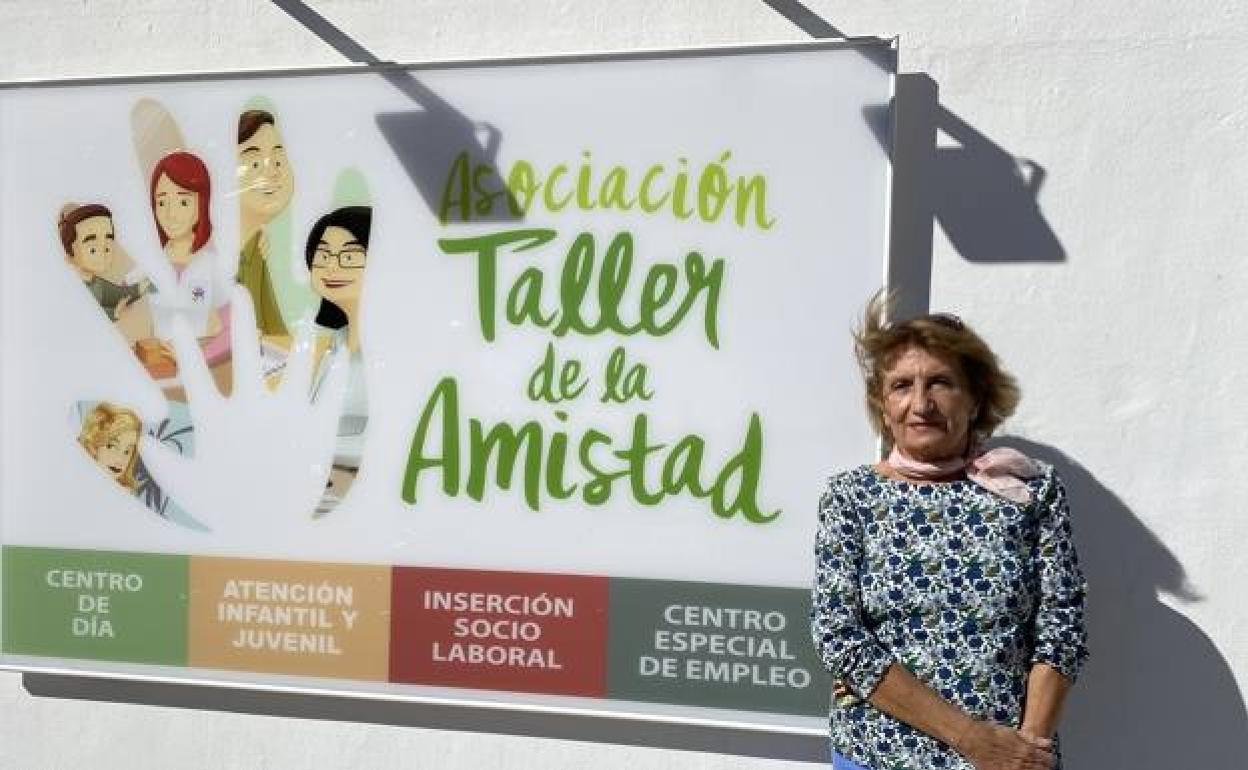'We don't want to put limits on disability, we want to offer opportunities'
interview ·
Gloria Matutano, the founder of the Taller de la Amistad in Nerja, has returned to the post of president with the challenge of building a residence and sheltered housingGloria Matutano was born in Madrid 75 years ago. In the early nineties she worked in the public school San Miguel de Nerja as a teacher of Therapeutic Pedagogy, what was then known as Special Education. She was only there for two years, but left an indelible mark on a group of local families with disabled children, whom she helped to set up the Taller de la Amistad association in 1996. She is the association’s founder and was president for six years. In October she was re-elected to this position at a member’s meeting.
-How did the association start?
-I spent most of my life working in Madrid. until in 1991 when I came to Nerja. My son has a disability, he was the person who encouraged me to start a club, a workshop for these kids who were at school at the time. Then I spent three years living in England and it was when I came back that we founded the association.
-Why have you returned to the position?
-For me it's like coming home, I've always kept involved. All the kids always hug me when they see me. The centre has been growing gradually. It's a marvellous thing. I want to thank the previous board of directors because the accounts are very good and thank them for their work. We wanted to re-establish the spirit of the Taller de la Amistad. We didn't want any quarrels or disputes, we wanted everyone to be happy and satisfied. What matters most to us is the present and the future of these kids. Every time we make a decision, what matters is the quality of life of people with disabilities.
-What are the objectives?
-The idea is to return to the spirit that the association had, of companionship, friendship, that everyone works happily, both users and workers, and that no one is above anyone else. The director is everywhere and when I come here I am one of them. We don't want people to feel overwhelmed or inspected.
-What services do you offer and how many people use them?
-We have 129 members, 70 volunteers and 320 people who use our services, of which 37 are in the day centre and 25 in the special employment centre, although in high season this figure rises. Then there is early care, which has 120 children from zero to six years of age; child and youth care, which has 66 and social and labour insertion, which has 28, ten of whom are from the day centre. We also have projects such as work experience and training. In total, we have 50 workers.
-The world of disability is very diverse, what challenges do you face?
-Social and labour inclusion. We have different directions we can take and therapeutic routes, depending on the situation. A day unit is not the same as a person who requires support for outside work. From the beginning we didn't want to set limits but to offer possibilities. That has always been the idea of the Taller de la Amistad, for which we copied ideas of projects run in Germany. Sheltered housing and a modern residence are our challenges now.
-It's for families, as parents are getting older?
-That's right. We want to build a modern residence. The town hall has yet to give us a plot of land. We are going to make it open, with supervised housing so that everyone has their own support, on different levels. Another thing is to have an area for people with more acute issues. In principle it would have 60 places. The laundrette that we have as a special employment centre would also go there. We don't have a budget or a timetable. The architect Francisco Sánchez is continuing to help us altruistically.
-In what fields do the adult users work?
-Laundry, gardening, cleaning and parking control. The services are profitable, both economically and socially. We have people from the occupational centre who are going to do internships in the special employment centre. The important thing is the attitude of the parents and the users. It is the same with the residence.
-How is the support from public administrations?
-The town hall is very committed and will give us the land for the residence, as well as continuing to support us financially. Then, the number of places allocated will rise by 2.6 per cent in 2022, but these figures are insufficient, because families and associations are having to bear more and more of the costs. Seventy per cent of our funding comes from public subsidies. They are being met at the moment, but we are paid in arrears, so we have to bring them forward by up to a year and a half. However, the accounts are healthy, the previous board of directors has done a great job in this respect. We have a great team, we are very lucky. When I started it was very difficult to encourage the parents. The workers we have are great professionals; they are the ones who make it all happen.

